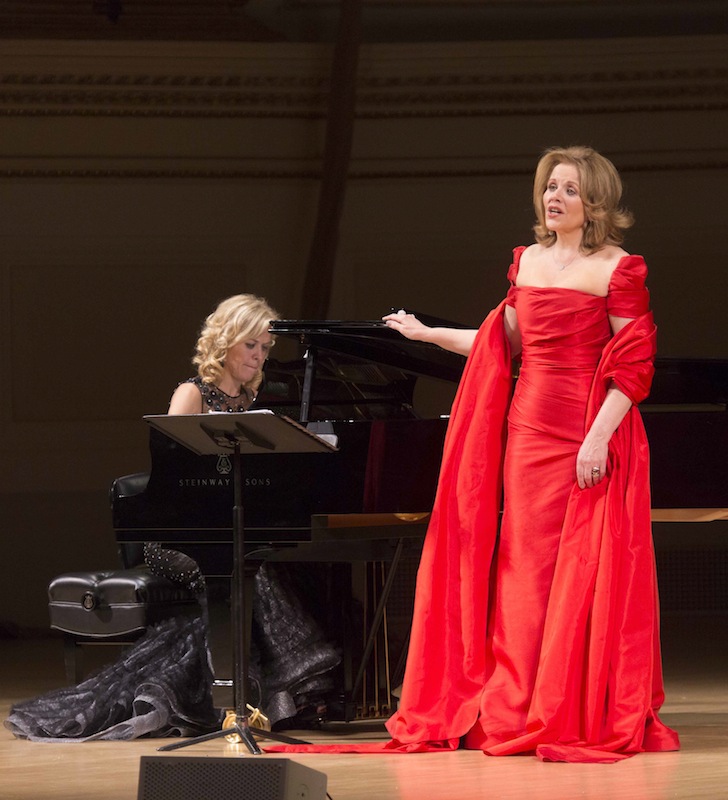Fleming rises to moments of greatness in Carnegie recital

Renée Fleming performed a recital Wednesday night at Carnegie Hall with pianist Olga Kern. Photo: Richard Termine
No mistaking it, there is something of a valedictory quality to Renée Fleming’s performances these days, whether she’s selling out recitals or touring through her greatest operatic roles.
For all the celebratory feel of her sold-out Carnegie Hall recital on Wednesday, there was noticeable wear on her voice. And yet more than a few moments of true brilliance still exhibited the superior artistic sense that have characterized the finest moments of her career.
Robert Schumann’s Frauenliebe und -leben, her opening set, was a perfect example. In the early part of this cycle, it was hard to get past the ways in which Fleming’s instrument is sounding tired: there is a stretched quality to her sound, particularly on straight tones; she sounds encumbered when trying to work through fast writing; soft notes in her chest voice tend to get swallowed up entirely.
As the cycle progressed, though, and she allowed her voice to open fully and vibrate naturally, Fleming’s tone became consistent, flowing, and remarkably warm. She even managed to summon a lively chirp to fit the excitement of “Helft mir, ihr Schwestern.” The final song, “Nun hast du mir den ersten Schmerz getan,” was breathtaking, and provided a striking contrast to the breathless joy that had just preceded it. Here there was a harrowing, accusing power in Fleming’s chest voice, and she vividly conveyed every shade of grief in the music and text, from wounded anger to quiet resignation.
Her Rachmaninoff set also began with cause for concern, as Fleming’s pitch strayed flat in the opening bars of “In the silence of the secret night.” She couldn’t quite carry the cheeky introduction to “The waterlily,” and her penchant for heavy portamento often exposed a breathy slide when she tried to diminuendo quickly across an interval. Throughout these songs, though, she crafted beautiful, sighing phrases, even if her attempts at coy little hairpin turns did not come off particularly well. “Sing not to me, beautiful maiden,” was haunting in its plaintive melancholy.
In most of her work accompanying Fleming on the first half (as well as in “Lilacs,” performed in Rachmaninoff’s own transcription for solo piano) Olga Kern phrased well and supported the vocal line, but played with a plain, straightforward approach that lacked much variety in color or texture.
Yet leading off after intermission, she gave a manic account of Debussy’s “Feux d’artifice.” Her reading was not so focused on coloration as many Debussy interpretations; instead she made intensity of expression her goal and gave a captivating, disorienting performance.
Kern was more subdued, though equally effective, in her accompaniments to Debussy’s Ariettes oubliées, which also featured Fleming’s best singing of the evening. The “chanteuse” character of these songs proved an excellent fit for the soprano’s voice, relying less on clarity and brightness of tone, and allowing her instead to embrace the duskier quality of her present voice. She seemed not quite agile enough to toss off “Chevaux de bois,” but the rest were marvelously crafted, from the coy sweetness of “Green” to the aching intensity of “Spleen.”
Five songs by jazz singer/pianist Patricia Barber, arranged by Simon Frisch, seemed born of the spirit of self-reinvention that performers often find late in their careers. Most were simpler than Fleming wanted to make them, and the soprano fell into the common trap of trying to sing in a kind of art song–lounge jazz hybrid that drowns both idioms in syrup. The best by far was “Morpheus,” a languid, steamy number with a molasses-like melody that was strikingly reminiscent of Poulenc’s “Hôtel.”
If encores are dessert, Fleming’s on Wednesday were cotton candy. “Danny Boy” featured an odd, jazzy piano accompaniment and what sounded like partially improvised lyrics (though the missing syllables in the closing stanzas could have been due to Fleming’s fuzzy diction). “O mio babbino caro,” the peerless chestnut from Puccini’s Gianni Schicchi, managed to soar on one or two of the top notes, but was given a fairly cursory treatment. The most rewarding of Fleming’s extras was her treatment of “Shall we dance” from The King and I. Making no apology for singing a Broadway standard with an operatic voice, she gave a bright, spirited, enchanting rendition of one of Rodgers and Hammerstein’s most charming creations.